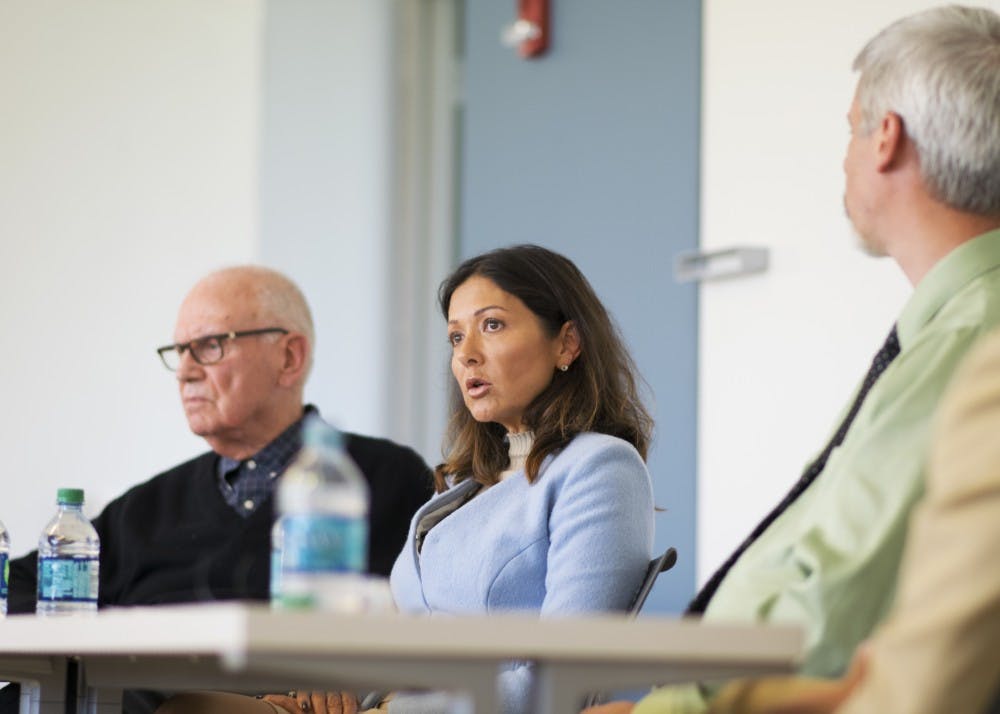Former Congressman Lee Hamilton, who worked with nine presidents during his career, said he was struck by how most of them would end meetings by asking, “Are we doing the right thing?”
Hamilton spoke with Countess Alexandra Christina and Rev. Forrest Gilmore in a discussion titled “Ethical Leadership in Government, Business and Not-for-Profit” Thursday evening in the Global and International Studies building.
The panel discussed how ethics and the importance of listening to other people’s values to better reach a positive solution to arguments.
“It is getting harder and harder to make policy in a representative democracy,” Hamilton said. “Then again, no one said a representative democracy was easy.”
Alexandra Christina, Countess of Frederiksborg in Denmark, spoke about ethics in terms of business.
She is a member of the board for Ferring Pharmaceuticals and said it's important for a multinational corporation to have the same ethical tone all across the world.
“The top managers at all the different branches need be saying the same things and keeping the same values,” Countess Alexandra said. “We need to walk the talk.”
Gilmore provided a voice for nonprofits. He is the executive director of the Shalom community center and works with the homeless and impoverished. Gilmore admitted that when he first started working at Shalom, he avoided identifying himself as a minister.
“Eventually I became more comfortable stating my title,” Gilmore said. “The title welcomes values into the conversation.”
Gilmore said by having a values-based approach motivates people to do good.
He looks to Jesus as a role model. When people tell him living a virtuous and ethical lifestyle is self-sacrificial, he said he disagrees.
“It is a joyful way to live,” Gilmore said. “It is possible to live a deeply ethical lifestyle and there’s beauty in that.”
Hamilton said he has confidence in the decency of the Americans people who are doing the best they can to live life in peace and sustainability, and to make a better life for their children.
Countess Alexandra said they need to convince companies to adopt ethics committees. A grassroots movement can start quickly if, for example, a consumer complains after he buys a shirt and finds out the shirt was made by underpaid workers.
“A company’s reputation is vital,” Countess Alexandra said. “With social media, a company's reputation can be tarnished almost instantly. Ethics drives the company’s reputation forward.”
Gilmore said he fights for people's basic human needs. Every person needs a place to sleep, go to the bathroom and feel safe.
Gilmore once participated in a retreat that involved living on the streets. He said it took him more than an hour to find a public bathroom he could use once.
His experience on the retreat motivated him to push for public bathrooms in Bloomington when many were against them. They ended agreeing to put up temporary public restrooms instead of permanent ones.
“You have to find mutual interests that can be leveraged to come to a solution that does good,” Gilmore said.
Hamilton said politics are fundamentally a search to remedy a social problem. When debating issues in Congress he said it was easy to exacerbate differences and the real challenge was to bring people together. It is important to accept realities and listen carefully.
It's important to listen to other people's points of view, he said. Then they can find commonalities that can result in a solution.
Hamilton said whenever a person reads a headline or sees something on the news that discourages them, they should remember the words of Jesse Jackson, a black politician from Chicago.
Jackson always ended meetings by saying, “Keep hope alive.”




